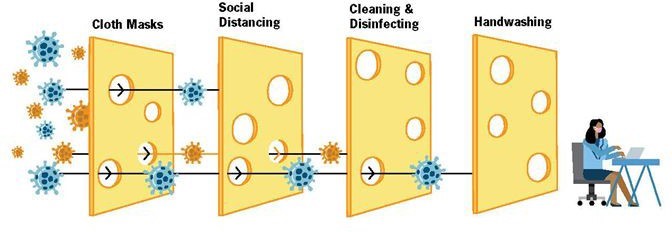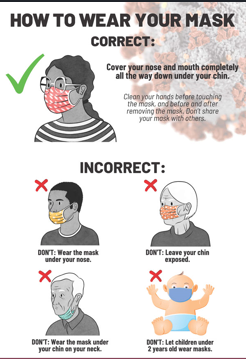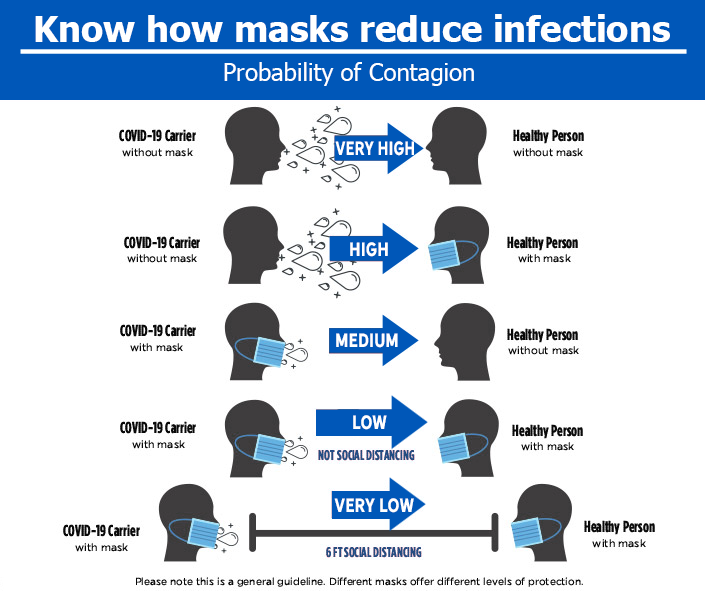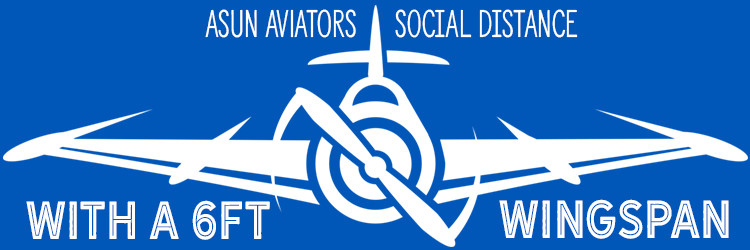Personal Safety Practices

The COVID-19 pandemic requires multiple layers of protection to serve as safeguards for our community. When used together consistently, the holes (or weaknesses) in any single layer of protection may be reduced by the strengths of multiple layers of protection.
All employees and students will be required to complete an online COVID-19 Health and Safety Training prior to returning to campus. The purpose of this training is to ensure that all employees and students have a shared understanding of our individual responsibility for mitigating the risks associated with COVID-19.
In order to protect the health of the entire community, we are not only responsible for following the safety practices ourselves but also responsible for helping our colleagues to follow them as well. When you see someone who has forgotten to put on their mask or forgotten to clean a common area, simply remind them of proper protocol with a polite, “Please.” For example, “Please wear a mask when you’re in the office.” And for those of us who receive a reminder from a colleague, we should politely say “Thank you” and immediately resume the proper safety protocol.
Face Masks

Face masks are recommended by the Centers for Disease Control and Prevention (CDC) to help to slow the spread of COVID-19 and help prevent asymptomatic carriers from unknowingly transmitting it to others.
Face coverings, however are not a substitute for proper social distancing.
- Face masks must be worn by all employees and students in campus buildings when in the presence of others and in public settings (e.g., common workspaces, meeting rooms, classrooms, break rooms, etc.).
- Faculty will not be required to wear a face mask while lecturing as long as there is a plexiglass barrier between them and the students.
- Masks are required outside if social distancing is not possible or if several people are congregating.
- Face masks and cloth face coverings (e.g., a tightly woven t-shirt or bandana that has been folded to create multiple layers) should be worn only for one day at a time; it should be properly laundered before use again. Having a one week supply of cloth face coverings can help reduce the need for daily laundering.
- ASUN will provide each employee with two face masks and each student with one face mask.
- The appropriate use of face masks or coverings is critical in reducing risks to others near you. The possibility of COVID-19 spread exists even if you do not feel sick.
- Anyone refusing to wear a mask will be denied campus access – there will be no exceptions.
- Click here for instructions on how to care for and handle your face mask.

Social Distancing
Keeping space between you and others is one of the best tools we have to avoid being exposed to COVID-19 and slowing its spread. Because people can spread the virus before they know they are sick, or without ever developing symptoms, it is important to keep your distance from others, even if you have no symptoms or are wearing a face mask or covering. Physical distancing is important for everyone, especially to help protect people who are at higher risk of getting very sick. Employees and students on campus must follow these physical distancing practices:
- Stay at least six feet (about two arms’ lengths) from other people at all times.
- Stay out of crowded places and avoid mass gatherings.
- Institutional Services will arrange classrooms and shared spaces to accommodate for social distancing.
- Lower occupancy limits will be observed in common-use areas such as The Hub, Delta Grill and conference rooms.

Cleaning/Disinfecting
Institutional Services will have primary responsibility for cleaning offices, workspaces, classrooms, and other high touch point surfaces on campus based on Department of Health guidelines for disinfection. Although Institutional Services will have primary responsibility for disinfecting surfaces, employees and students will also need to assist.
- It will continue to be the responsibility of building occupants to clean their own, non-public spaces such as cubicles and offices.
- Building occupants should wipe down their own frequently used surfaces before and after use with products that meet the EPA’s criteria for use against COVID-19 and are appropriate for the surface.
- Please frequently wipe down work surfaces, door knobs, and any other high touch surfaces including shared-space equipment (e.g., copiers, printers, computers, A/V and other electrical equipment, coffee makers, lab and office light switches).
- Institutional Services will provide the materials necessary for wiping down surfaces.
- Classrooms will be stocked with supplies for self-cleaning of individual spaces.
Handwashing/Hand Sanitizing
Washing your hands is one of the easiest and most important things you can do to stay healthy and stop the spread of bacteria and viruses.
- You should wash your hands with soap and water for at least 20 seconds:
- after touching eyes, nose or mouth;
- after blowing nose;
- after sneezing or coughing into the hand;
- after toughing contaminated surfaces;
- after using a disinfectant product;
- before preparing food;
- before and after eating;
- If soap and water are not readily available, use a hand sanitizer that contains at least 60% alcohol. Cover all surfaces of your hands and rub them together until they feel dry.
- Avoid touching your eyes, nose, and mouth. Wash your hands after touching your face.
- Institutional Services will maintain hand-sanitizing stations in all buildings on campus (subject to the availability of hand sanitizer) and ensure bathrooms are adequately stocked for regular handwashing.
Coughing/Sneezing Hygiene
If you are in a private setting and do not have on your cloth face covering, remember to always cover your mouth and nose with a tissue when you cough or sneeze, or use the inside of your elbow. Throw used tissues in the trash. Immediately wash your hands with soap and water for at least 20 seconds. If soap and water are not readily available, clean your hands with a hand sanitizer that contains at least 60% alcohol.
While none of these interventions is perfect, when used in conjunction with a broader range of safety practices, the risk of COVID-19 transmission is significantly reduced.